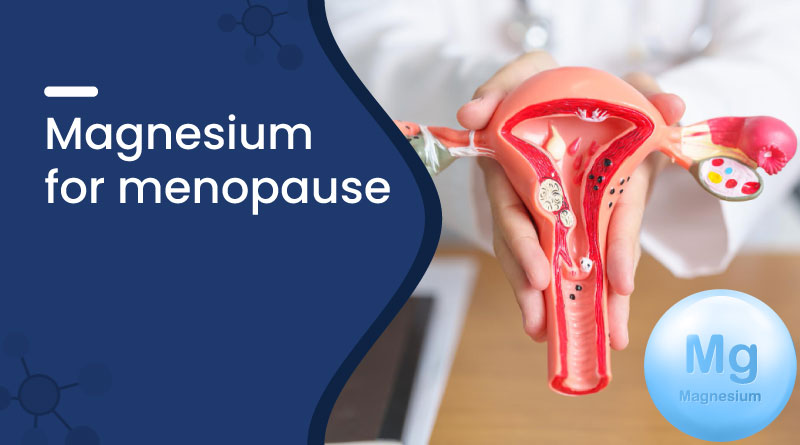Magnesium for Menopause Relief | Benefits, Uses & Tips


Menopause brings a wave of physical and emotional changes for women. Magnesium for menopause is gaining attention for its potential to ease symptoms like hot flashes, mood swings, poor sleep, and bone loss. This simple mineral may be the key to making menopause more manageable.
Let’s explore how magnesium can support women through this transition.
What Are the Common Symptoms of Menopause?
During menopause, estrogen levels drop, which can trigger several uncomfortable symptoms such as:
- Hot flashes and night sweats
- Mood swings and irritability
- Insomnia and fatigue
- Muscle cramps and joint pain
- Bone thinning and osteoporosis
These changes are natural, but they can impact daily life. That’s where magnesium can help.
How Does Magnesium Help with Menopause Symptoms?
Magnesium balances hormones, calms nerves, and supports over 300 body functions. Here’s how it may ease menopausal discomfort:
- Improves sleep quality by promoting melatonin production
- Reduces mood swings and anxiety through neurotransmitter regulation
- Supports bone health by working with calcium and vitamin D
- Relieves muscle cramps and tension
- Eases fatigue by supporting cellular energy production
Can Magnesium Improve Sleep During Menopause?
Yes, many women report better sleep quality after increasing their magnesium intake. Menopause often brings insomnia or restless sleep, and magnesium helps by:
- Calming the nervous system
- Increasing GABA (a relaxing brain chemical)
- Supporting melatonin production
Magnesium glycinate and magnesium citrate are gentle forms often used for sleep support.
Does Magnesium Help with Menopausal Mood Changes?
Mood changes, anxiety, and even mild depression are common in menopause. Magnesium helps regulate cortisol, the stress hormone, and supports the production of serotonin, the feel-good chemical.
Low magnesium levels are often linked with higher anxiety and irritability, so ensuring optimal intake may help balance emotional health during this phase.
How Does Magnesium Support Bone Health During Menopause?
Lower estrogen during menopause raises the risk of osteoporosis. While calcium and vitamin D get the spotlight, magnesium is essential too. It helps by:
- Improving calcium absorption
- Stimulating calcitonin, a hormone that maintains bone density
- Preventing calcium from depositing in soft tissues
Without adequate magnesium, even a calcium-rich diet may not protect bones effectively.
Which Type of Magnesium Is Best for Menopause?
Different types of magnesium have different benefits. For menopause:
- Magnesium glycinate – Gentle; supports sleep and mood.
- Magnesium citrate – Supports digestion; mild laxative effect
- Magnesium malate – Energizing; eases fatigue and pain.
Avoid magnesium oxide, as it’s poorly absorbed and can cause stomach upset.
How Much Magnesium Do Women Need During Menopause?
The recommended daily allowance (RDA) for magnesium in adult women is around 310–320 mg. However, during menopause, some may benefit from slightly higher amounts through food or supplements.
Always start low and go slow to avoid side effects like diarrhea. Consulting a healthcare professional is advised.
What Are the Best Dietary Sources of Magnesium?
You can boost magnesium intake naturally through a balanced diet. Rich sources include:
- Dark leafy greens (spinach, kale)
- Nuts and seeds (almonds, pumpkin seeds)
- Whole grains (brown rice, quinoa)
- Legumes (black beans, lentils)
- Dark chocolate
Tip: Cooking methods matter. Steaming or lightly sautéing helps retain magnesium content in vegetables.
Frequently Asked Questions
Q: Is magnesium safe to take during menopause?
A. Yes, magnesium is generally safe. Just stick to the recommended dose and consult your doctor if you have kidney issues.
Q: How long does magnesium take to work for menopause symptoms?
A. Some women notice improvements in sleep and mood within 1–2 weeks, while others may take longer.
Q: Can magnesium cause side effects?
A. High doses can lead to diarrhea or stomach upset. Start low and choose a gentle form like magnesium glycinate.
Q: Can magnesium replace hormone therapy?
A. No. Magnesium supports symptoms but doesn’t replace HRT (hormone replacement therapy). It can be a helpful add-on, though.
Q: Best time to take magnesium?
A. If you're taking it for sleep or relaxation, night is better. For energy and bone support, morning or afternoon works fine.
Conclusion: Is Magnesium a Good Choice for Menopause Relief?
Magnesium for menopause is a natural, low-risk tool to manage symptoms like sleep disturbances, mood swings, and bone loss. While it's not a cure-all, it can significantly improve quality of life when combined with a balanced diet and healthy lifestyle.
Adding magnesium—through food or supplements—could be the "silent supporter" your body needs during this transition.
Recent Blogs
Disclaimer : Zeelab Pharmacy provides health information for knowledge only. Do not self-medicate. Always consult a qualified doctor before starting, stopping, or changing any medicine or treatment.
















 Added!
Added!